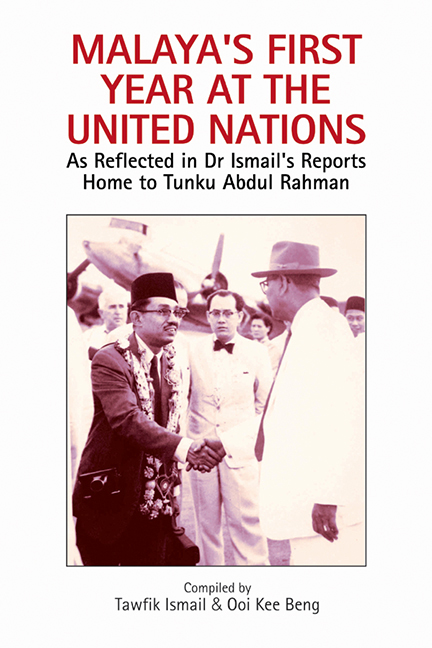 Malaya's First Year at the United Nations
Malaya's First Year at the United Nations Published online by Cambridge University Press: 21 October 2015
December 30 [1957] — Call on Ambassador Khoman of Thailand
Indonesia. Ambassador [Thanat] Khomantried to persuade the Dutch to agree to talk with Indonesia, but the Dutch refused. When I told him that I was surprised at the pace with which the Indonesians had seized Dutch investments and that in doing so, had damaged the economy of Indonesia, Ambassador Khoman's opinion was that the Indonesians could not do otherwise. Indonesia has about 3,000 islands and if she wanted to do as she did, she must seize on the emotional issue generated by the West Irian question. She is further goaded by the Communists. He thought the U.S. and British Governments might help the Indonesians. I thought it unlikely because this will strain relationship with the Dutch and French. The U.S. would like to step in, but she is tied by NATO commitments.
Afro-Asian Solidarity Conference. The Ambassador was afraid that a scheme might be hatched at this Conference, similar to that at the Calcutta Conference, with the purpose of advancing Communist aims in South-East Asia.
Communist and Nationalist China. He thought that Malaya was wise not to recognise either of them. Cambodia, the Ambassador said, recognises both.
Communism in Malaya. The Ambassador asked where the Communists in Malaya got their arms from. I said they were probably smuggled in. I further said that when Malaya was a dependency of the United Kingdom, which recognises Communist China, there was established the Bank of China which, no doubt, surreptitiously helps the Communist.
On Getting Together. The Ambassador expressed the wish that since Malaya and Thailand are such close neighbours, we should get together to discuss things which need not commit our Governments. I reciprocated his wish and said that this was also the fervent desire of our Prime Minister.
January 6, 1958 — Call on the British Ambassador
Economics. We discussed the economic position of the USA and the Ambassador quoted a well-known economist (whose name was not mentioned) who said that although in the long run, for example, a period of 10 years, the USA economy may be balanced, in the intervening period it is subjected to fluctuations which have repercussions on world economy.
To save this book to your Kindle, first ensure no-reply@cambridge.org is added to your Approved Personal Document E-mail List under your Personal Document Settings on the Manage Your Content and Devices page of your Amazon account. Then enter the ‘name’ part of your Kindle email address below. Find out more about saving to your Kindle.
Note you can select to save to either the @free.kindle.com or @kindle.com variations. ‘@free.kindle.com’ emails are free but can only be saved to your device when it is connected to wi-fi. ‘@kindle.com’ emails can be delivered even when you are not connected to wi-fi, but note that service fees apply.
Find out more about the Kindle Personal Document Service.
To save content items to your account, please confirm that you agree to abide by our usage policies. If this is the first time you use this feature, you will be asked to authorise Cambridge Core to connect with your account. Find out more about saving content to Dropbox.
To save content items to your account, please confirm that you agree to abide by our usage policies. If this is the first time you use this feature, you will be asked to authorise Cambridge Core to connect with your account. Find out more about saving content to Google Drive.